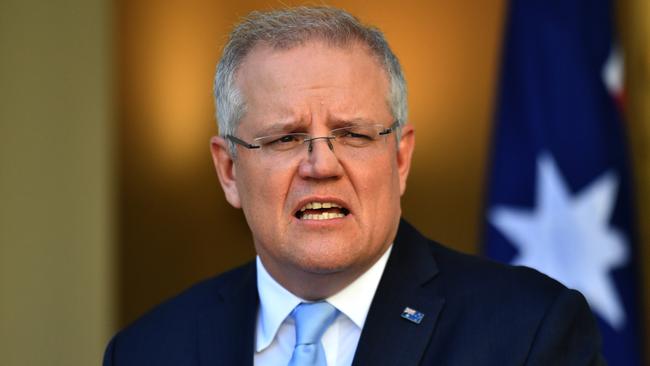Business calls for urgent tax reform in wake of coronavirus crisis
Scott Morrison will push business and unions to join forces to drive a wave of reform that has not been seen for 30 years.

Scott Morrison will push business and unions to join forces to drive a wave of reform that has not been seen for 30 years, when Australia was last in recession before the economy rebounded to an unprecedented era of growth.
Corporate Australia has also been warned there will be no bailouts for companies that go broke during the pandemic, as senior government sources cited a refusal to throw money at Virgin Australia as sending a strong message to other companies in distress.
Business groups have urged the government to pursue an immediate flat company tax rate of 25 per cent and to reconsider its opposition to increasing the GST.
Business leaders and former prime minister Malcolm Turnbull have also called on the Prime Minister to reconsider his opposition to cracking down on negative gearing, franking credits and superannuation concessions.
Australian Industry Group chief executive Innes Willox urged the government to have reform proposals ready for when parliament resumes in May.
“There is no better time than now for governments to lay out what the agenda will be. This is part of the … economic pathway out. And this is what businesses and households need to see,” Mr Willox said.
He said a flat company tax rate should be pursued and the government should keep an open mind on revenue measures.
“We would argue that 25 per cent should be the ceiling of where we need to go, but we need to first get to 25 per cent,” Mr Willox said.
“Everything in terms of how we tax and how we fund and how we spend must be up for grabs. This is why governments, both state and federal, will need to be courageous and act quickly. We need to give serious consideration to how we deal with consumption tax.”
But One Nation and Centre Alliance have already rejected the push to reduce the company tax rate to 25 per cent for businesses with an annual turnover of more than $50m, declaring there would not be a compelling case even following the coronavirus pandemic.
The company tax rate for businesses with an annual turnover of less than $50m is 27.5 per cent and will reduce to 25 per cent in 2021-22. For all other businesses it remains at 30 per cent.
The Australian understands the Morrison government will not rush to a reform agenda and will first seek to build a new consensus for reform around business, unions and the community.
The national cabinet, which was established in response to the coronavirus crisis, is also being considered by some as a potential longer-term vehicle for co-operation between the states and the commonwealth on broader tax reform and deregulation.
Vested interests have been told to forget about dusting off old proposals, with Mr Morrison firmly of the view the country is now in the same position it was 30 years ago.
Following Reserve Bank governor Philip Lowe’s call for an overhaul of the taxation and industrial systems, the government insisted it had no reform plan yet on the table, with the October budget likely to be the first catalyst for any potential reform of tax policy.
However, the government has also ruled out any lift in taxation and has said it will maintain its policy of lowering tax as a means of growing the economy.
Josh Frydenberg on Wednesday backed Dr Lowe’s call to arms while opening the door to further company tax cuts, but said the government as yet had no plans on broader tax reform.
“Well, he’s absolutely right that Australia must continue to embrace the productivity agenda,” Mr Frydenberg said.
“As you know, that is in multiple areas, from infrastructure, to skills, to deregulation, industrial relations reform, and of course tax reform. We’ve said we’ve got no plans to lift the GST. The states are in control of land tax and stamp duty-related issues, and Victoria and NSW have talked about reforms in those areas.
“But we will continue to retain an open mind as to how we can go forward to lower the tax burden overall.”
The government has also all but ruled out a revival of old manufacturing industries and would not pick industry winners or losers while pointing to the potential for a supercharged technology base to reposition Australia’s post-pandemic place in the world.
Australian Chamber of Commerce and Industry chief executive James Pearson said the government should fast-track planned tax cuts for businesses with a turnover of up to $50m and also revisit relief for big business.
The government’s income tax cuts that passed the parliament last year will cost the budget $158bn over a decade, on top of $144bn of income tax relief legislated by the Turnbull government.
“We are all in this together. It doesn’t make sense to separate large companies from small companies when it comes to critical policy measures like tax, which have such a big effect on incentivising to invest and grow businesses,” Mr Pearson said.
He urged the government to reconsider its opposition to capping negative gearing and cash refunds for franking credits.
Business Council of Australia chief executive Jennifer Westacott said big business tax cuts should be revived as part of a broad suite of reforms. “It is important for us to put it back on the table, but along with other tax reforms. It’s not the only thing that needs to be done,” Ms Westacott told Sky News.
“It’s important that we look at the state taxes, the productivity-sapping stamp duty taxes, payroll tax. (There is also) the question of the right configuration of the state taxes, whether or not we bring forward those other income tax cuts.”
Tony Shepherd, who headed the Abbott government’s 2014 National Commission of Audit, said red tape needed to be radically reduced to get business firing after the pandemic.
“The big things that would get things moving would be deregulation that reduces the cost of doing business,” Mr Shepherd said. He also said the government should pursue a company tax rate lower than 25 per cent so it was internationally competitive. “When countries like Sweden have got a lower tax rate and they are the poster child of the socialist-left, you have got a problem,” he said.
“Get rid of payroll tax, get rid of stamp duty, these are impediments to investment and employment. And maybe increase the GST to fund that.”
PwC chief executive Luke Sayers said there needed to be a “holistic review of the tax system”.
“The challenge will be how we roll back the government’s financial support package without creating a cliff for businesses to fall off,” Mr Sayers said.
“We need to turbocharge infrastructure spending.”
Anthony Albanese said he was concerned the government would use the crisis to pursue “the old right-wing agenda”.
“We’ll have ‘labour market reform’, which is code for further attacks on unions. And we’ll have corporate tax cuts,” the Opposition Leader said.
“What’s the plan for them to pay back some of the debt? We’ve seen an astronomical increase in debt, and now they are talking about revenue reducing it further.”
One Nation leader Pauline Hanson, who controls two crucial Senate votes, said she was determined not to give the government support for big business tax cuts.
“If we have to give tax cuts to corporations, it’s not going to give us any guarantee that they’re going to increase their businesses (here),” Senator Hanson said.
Centre Alliance senator Rex Patrick said tax cuts for big business “seems moot” because more than 220 large companies that collectively generated $850bn in turnover over five years paid no tax in that time.
If Labor and the Greens oppose government legislation in the Senate, Mr Morrison must win over three of the five crossbenchers to pass bills. One Nation and Centre Alliance represent four of them.
ADDITIONAL REPORTING: ROSIE LEWIS






